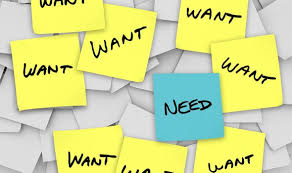
The result was unmanageable national debt, waste of natural resources, class conflict and a frustrated populace. Now, those who are retiring may find their resources have shrunk. Those still in the workforce are facing the necessity of living lean, a lifestyle for which they aren’t prepared. It is no longer possible to rob the future to pay for fun and games in the present. Now it’s time for serious reflection on whether “wants” can be allowed to dictate personal finances.
It is possible to live frugally and build up a reserve that will create financial security. But it requires some thinking in advance. At the top of the list is the essential attitude that needs must trump wants. You NEED a roof over your head. You WANT a mansion with a backyard pool. Getting the difference engrained in your mind is the starting point for financial independence.
As a very practical exercise, consider two scenarios: If you have a home with 2,300 square feet of space, purchased for $310,000 with 20 percent down on a 30-year mortgage at 4.5 percent interest, you pay some $1,259 per month. Under the “I need more” mode, you could consider a 3,200-square-foot home with an asking price of $496,000. The 20 percent down is now $99,200, a $37,100 increase. At the same mortgage rate and term, you face a monthly payment of $2,011, an increase of $752 per month. Investing the difference between the two houses, at 6 percent average growth rate, could net you $980,000 in reserves.
The comparison does not consider taxes, insurance, utilities and upkeep expenses or the pressure to fill extra space with “things” worthy of the more expensive home.
Owning too much actually can cause mental stress, experts say. Psychiatrist Elana Miller notes that “Having too much is hazardous to a healthy way of life. The more you own, the more time and energy you use to keep track of it and the more you worry about breaking or losing what you worked so hard to get.” She recommends learning to be grateful for what you have and determined to get by with less. An attachment to physical things may force you to work beyond the usual expectations.
Many of today’s health problems are related to excess. Obesity is rampant, with two in three Americans grossly over healthy weights. This has contributed to increases in diabetes, heart disease and some cancers. Surgeries to counter weight gain have made surgeons wealthy, costing $18,000 to $35,00, with costs likely not to be reimbursed by health insurance plans. The blame for the epidemic in overweight is directly attributable to overeating and the overuse of high-calorie foods and drinks. The size of portions also has increased as Americans clamor for more. The nutritionally wise suggest half of what the standard restaurant serves.
Better yet, they say, cut down on eating out and fix more nutritious and less expensive meals at home. If you do go out, share an entrée or take half home for another meal. Cutting 500 calories a day, for many people, can lead to a one-pound-per-week weight loss. Both your wallet and your body will be happier.
Living lean can result in more savings, more security for retirement, and the sense of well-being that comes with not stressing over possessions. You may live not only longer, but better if you feel positive about yourself and your situation. You’ll have more control of your future.




